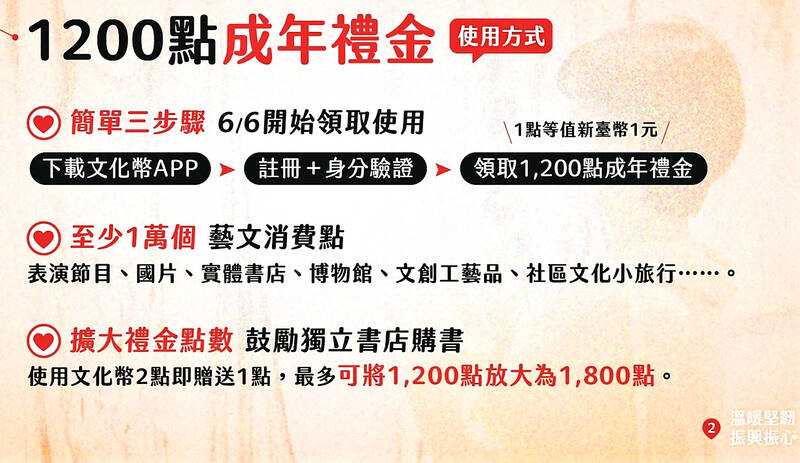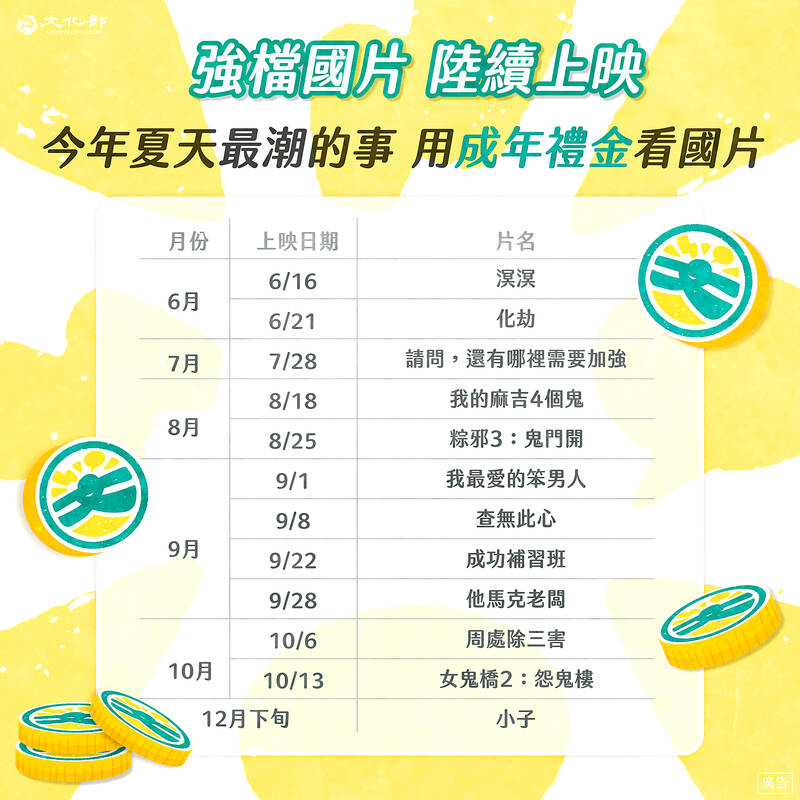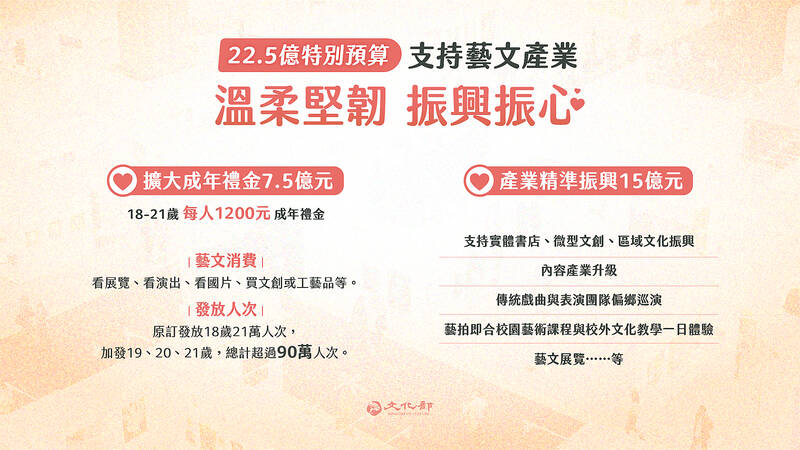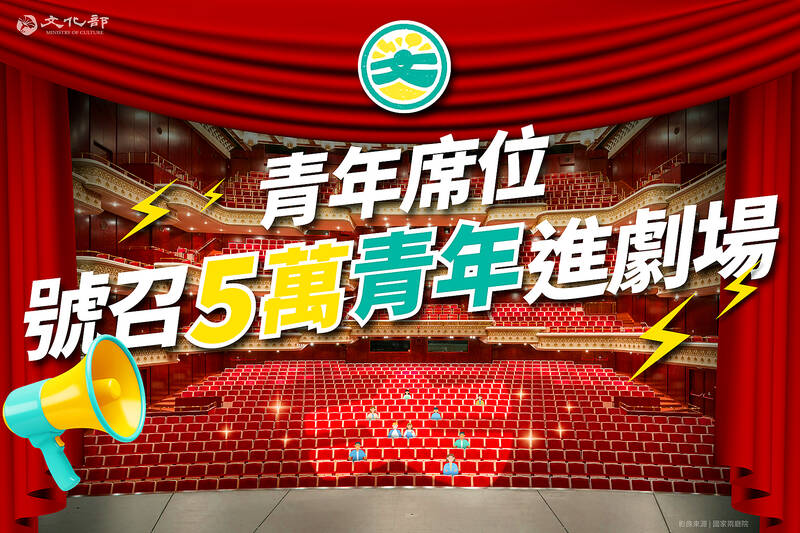The Ministry of Culture’s Young Adult Culture Vouchers initiative aiming to encourage young people to engage in the arts, cultural activities and theatergoing will be launched on June 6. As part of the initiative, young adults aged 18 to 21 will receive 1,200 “culture points.”
The program is applicable to young people aged 18 to 21 with a date of birth from Sept. 1, 2001 to Dec. 31, 2005, including Taiwanese nationals, foreign spouses with a Taiwanese resident certificate and Taiwanese new immigrants, etc. To collect the voucher with the 1,200 “cultural points,” applicants simply need to download the app and register, and they will receive the points with immediate effect for the use of seeing Taiwanese movies, watching live performances, buying books, visiting museums and buying cultural and creative products, as well as other arts and cultural consumption.
Purchasing performing arts tickets with the vouchers entitles recipients to a large discount of at least 50 percent off, and limited and exclusive “youth seats” to enjoy popular stage plays, concerts by internationally renowned symphony orchestras and local events, including concerts. Drawing from his own experience, Minister of Culture Shih Che said: “It would be fair to say that I grew up spending lots of time in concert halls,” and thanked National Performing Arts Center and local cultural centers for their contribution to the project.

Photo courtesy of Ministry of Culture 照片:文化部提供
According to the Ministry of Culture, the performing arts “youth seat” project is a joint effort of the three major venues under the National Performing Arts Center: the National Theater and Concert Hall in Taipei, National Taichung Theater and the National Kaohsiung Center for the Arts, as well as local governments’ cultural centers and performance halls. Young adults purchasing performance tickets from those venues with the voucher points are entitled to have a discount of at least 50 percent off.
For movies, the use of the vouchers is limited to Taiwanese releases. With more than 100 movie theaters in Taiwan participating in the program, it is hoped that the preferential ticket prices will attract NT$200 to 300 million more to the box office, increasing the domestic movie box-office revenue by 20 to 30 percent.
As the number of the theaters, bookstores and museums participating in the project continues to grow, more details are to be announced shortly.

Photo courtesy of Ministry of Culture 照片:文化部提供
(Translated by Lin Lee-kai, Taipei Times)
由文化部策畫的「文化成年禮金」計畫,旨在鼓勵青年學子支持藝文活動,進劇場觀賞節目,將於6月6日正式開放領取,18至21歲青年將獲得1,200點文化幣。
出生日期在2001年9月1日至2005年12月31日的18至21歲青年,包含本國國民、領有居留證的外籍配偶、新住民等,只要下載專屬App後註冊填寫基本資料,即可馬上領取成年禮金1,200點文化幣,並可立即使用於看國片、看表演、購書、逛博物館、買文創商品等藝文消費。

Photo courtesy of Ministry of Culture 照片:文化部提供
以成年禮金購買表演藝術門票,將能享5折或5折以下的超級購票優惠,坐在限量、專屬的青年席位,觀賞包含熱銷舞台劇、國際知名交響樂團音樂會、在地青年樂團等節目。文化部長史哲以自身的經驗提到,「我從小可說是混音樂廳長大的」,感謝國表藝及各縣市文化中心等的共同參與。
文化部說明,表演藝術「青年席位」邀集國家表演藝術中心轄下的台北兩廳院、台中國家歌劇院、高雄衛武營國家藝術文化中心等三大場館,以及各縣市政府文化中心、演藝廳共同推動。青年購買各表演場館推出青年席位的演出節目,以成年禮金點數全額支付,即可以5折或5折以下等優惠價格購入演出票券。
成年禮金在電影消費限定「國片專屬」,統計全台已有超過100家電影院加入成年禮金消費點,期盼在票價優勢等吸引力下,可挹注2至3億到國片票房,推升國片票房成長2到3成。

Photo courtesy of Ministry of Culture 照片:文化部提供
提供成年禮金優惠的電影院、書店、博物館等場館持續增加中,細節可密切關注後續公告。
(自由時報)

In an effort to fight phone scams, British mobile phone company O2 has introduced Daisy, an AI designed to engage phone con artists in time-wasting conversations. Daisy is portrayed as a kindly British granny, exploiting scammers’ tendency to target the elderly. Her voice, based on a real grandmother’s for authenticity, adds to her credibility in the role. “O2” has distributed several dedicated phone numbers online to direct scammers to Daisy instead of actual customers. When Daisy receives a call, she translates the scammers’ spoken words into text and then responds to them accordingly through a text-to-speech system. Remarkably, Daisy

Bilingual Story is a fictionalized account. 雙語故事部分內容純屬虛構。 Emma had reviewed 41 resumes that morning. While the ATS screened out 288 unqualified, she screened for AI slop. She could spot it a mile away. She muttered AI buzzwords like curses under her breath. “Team player.” “Results-driven.” “Stakeholder alignment.” “Leveraging core competencies.” Each resume reeked of AI modeling: a cemetery of cliches, tombstones of personality. AI wasn’t just changing hiring. It was draining the humanity from it. Then she found it: a plain PDF cover letter. No template. No design flourishes. The first line read: “I once tried to automate my

Every May 1, Hawaii comes alive with Lei Day, a festival celebrating the rich culture and spirit of the islands. Initiated in 1927 by the poet Don Blanding, Lei Day began as a tribute to the Hawaiian custom of making and wearing leis. The idea was quickly adopted and officially recognized as a holiday in 1929, and leis have since become a symbol of local pride and cultural preservation. In Hawaiian culture, leis are more than decorative garlands made from flowers, shells or feathers. For Hawaiians, giving a lei is as natural as saying “aloha.” It shows love and

1. 他走出門,左右看一下,就過了馬路。 ˇ He walked outside, looked left and right, and crossed the road. χ He walked outside and looked left and right, crossed the road. 註︰並列連接詞 and 在這句中連接三個述語。一般的結構是 x, y, and z。x and y and z 是加強語氣的結構,x and y, z 則不可以。 2. 他們知道自己的弱點以及如何趕上其他競爭者。 ˇ They saw where their weak points lay and how they could catch up with the other competitors. χ They saw where their weak points lay and how to catch up with the other competitors. 註:and 一般連接同等成分,結構相等的單詞、片語或子句。誤句中 and 的前面是子句,後面是不定詞片語,不能用 and 連接,必須把不定詞片語改為子句,and 前後的結構才相等。 3. 她坐上計程車,直接到機場。 ˇ She took a cab, which took her straight to the airport. ˇ She took a cab and it took her straight